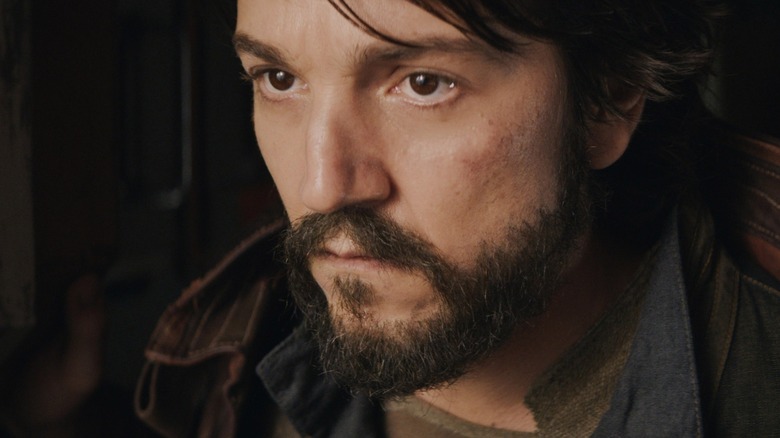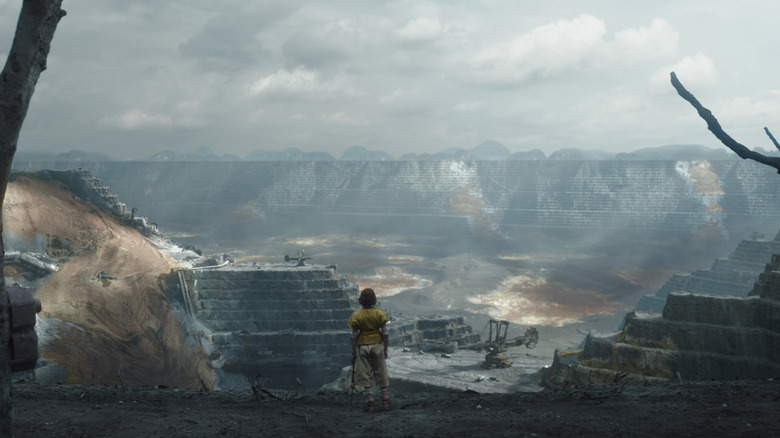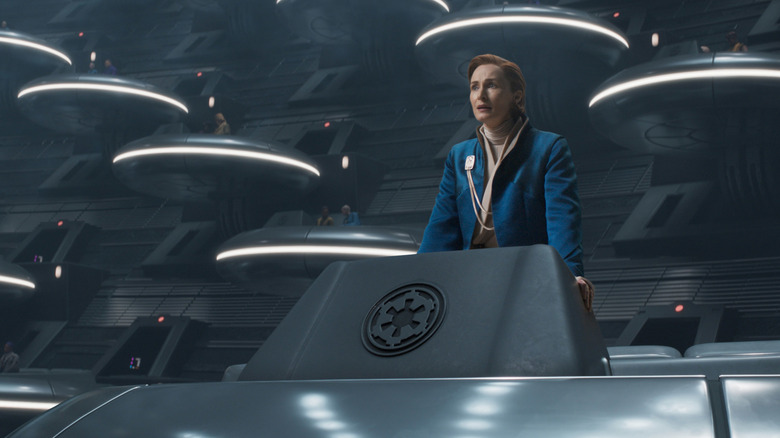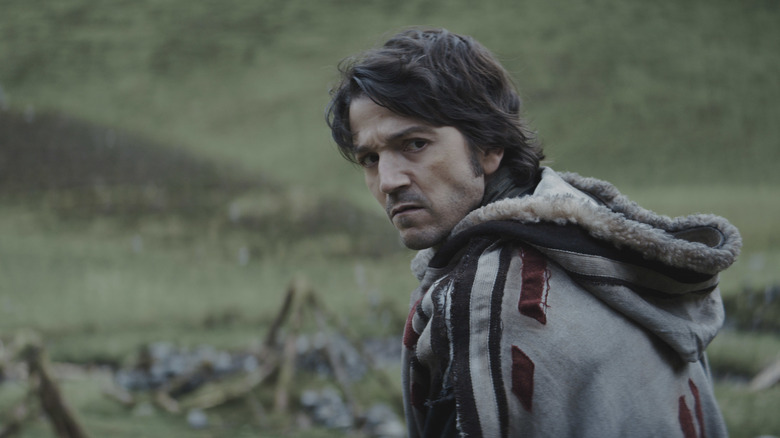Andor Fans All Think This Might Be The Key To The Show's Success
In the dizzying maze of peaks and valleys that is the modern "Star Wars" franchise, two plunges in particular are strikingly odd.
The first occurs in "The Rise of Skywalker," in which the film places great importance upon Chewbacca finally receiving a medal after not receiving one after the Battle of Yavin. Casual fans likely didn't remember such a small piece of trivia, ultimately the consequence of fictional Wookie culture and a few pages trimmed from George Lucas' screenplay. The most dedicated fans, on the other hand, had already seen the debate exhausted and solved multiple times with several plausible in-universe and behind-the-scenes explanations (as documented by IGN). Which begs the question, why address — with great dramatic heft and focus — what is essentially an Easter egg unimportant to both ends of the "Star Wars" fan-spectrum?
The second, more curious incident takes place in "Obi-Wan Kenobi." In a show seemingly concerned with its title character overcoming his guilt to protect the future of the galaxy, it was a surprising choice to end the story with a flashy grudge match that should've taken the Empire's most vicious killer off the board. Of course, all fans knew Darth Vader wouldn't die. He famously goes on to kill Kenobi in a later, more important fight. In "Kenobi," the series prioritizes a relatively unimportant duel with a known outcome over the themes and ideas of its story.
The cause of these oddities is You. "You," a "Star Wars" fan, want to see another Obi-Wan and Anakin duel regardless of context, to see Chewie finally get that medal — to further explore, explain, and revisit what made you fall in love with this universe long ago. At least, thats what Disney and Lucasfilm seemingly thought "you" wanted, but "Andor" is proving them wrong.
A mature Star Wars story
If critics had to agree on one word to describe Disney+'s new "Star Wars" drama, "Andor," they would likely choose the word "mature." The Atlantic claims right away that "Andor Is Star Wars at Its Most Mature," as does MovieWeb and LRM Online. In an op-ed for the A.V. Club, Cindy White uses the word twice as a mode of praise for the series, alongside words like "modern," "complex," and "grounded." It's perhaps no coincidence that "Andor" is currently the second highest rated "Star Wars" Disney+ series on Rotten Tomatoes, just three points behind "The Mandalorian."
In these glowing assessments of "Andor," the word "mature" feels synonymous with a departure from standard "Star Wars" practices. There is no "baby Yoda" to ensnare the audience during the final moments of "Andor's" pilot — instead, find the show's grimy, imperfect antihero remembering his own trauma stemming from an incident we've never seen on a planet we've never heard of. Where "mature" may be commonly interchangeable with "old," in the "Star Wars" universe it's a refreshing promise of something new – a promise resonating with not just critics, but fans as well.
Fans react to Andor, Episode 4
Discussing "Andor's" fourth episode in the subreddit r/StarWarsAndor, u/Videowulff wrote a lengthy appraisal of the show, expressing their enjoyment of the series as a marked and mundane deviation from "Star Wars" form. Seemingly shocking even themselves, they are incredibly invested in the bureaucratic drama of the Imperial characters — "No Admirals. No Generals. No discussions inside Star Destroyers but actual Bureaucracy and it is AMAZING... I cannot describe how invested I am in these Imperial BUREAUCRATS. These pencil pushers who are basically nothing more than the lower ranking members of the Imperial Version of the FBI/IRS. Because it's interesting. It's new."
Kicking off a lively and effusive discussion below, u/AmishAvenger responds "Couldn't agree more. It feels like I'm just watching a show that happens to be set in the Star Wars universe," while u/Due-Satisfaction-796 adds "Andor reminds me of the more mature but terrific pieces of work produced during the Expanded Universe era."
It's no accident that "Andor" doesn't feel like classic "Star Wars," though, because that happens to be the superpower of its creator.
"Andor" showrunner and "Rogue One" co-writer Tony Gilroy has not kept his distance from "Star Wars" a secret. In an interview with The Hollywood Reporter, he makes it clear that the galaxy far, far away was even further from him when he signed on to punch-up the screenplay for "Rogue One." Reflecting on this trait, Gilroy felt his lack of connection to the universe's past allowed him to create something fresh for its future. It's a trait he protects on the set of "Andor," actively requesting that all involved disavow themselves of any reverence they may have for the franchise.
Let the past die
The challenge of innovating within a universe so well-known has been acknowledged by previous "Star Wars" creators, including the man behind the polarizing film "The Last Jedi," Rian Johnson.
In an interview with Empire just this year, Johnson stated of his work "I think it's impossible for any of us to approach 'Star Wars' without thinking about it as a myth that we were raised with, and how that myth, that story, baked itself into us and affected us." This element that Johnson is describing caused some of those involved with "Andor" to change the way they approached storytelling, forcing Gilroy to impose his distance from this "myth" on his cast and crew.
Like "Andor," "The Last Jedi" strove to take "Star Wars" in a new, complicated — and yes, mature – direction — but that film's reception by fans was far less positive. The A.V. Club's Cindy White presents an analysis that offers an explanation for this discrepancy. According to her assessment, "Star Wars" fans react as though something has been taken from them when a story steers the known aspects of the universe in fresh directions — especially when trying to mend the disparity of representation in the "Star Wars" galaxy. As White states toward the end of their piece, "Better to wipe the slate clean and start from a place that's fresh and unexplored."
Or, in the words of Rian Johnson, through a certain Sith Lord, "Let the past die. Kill it if you have to. It's the only way to become who you were meant to be."



